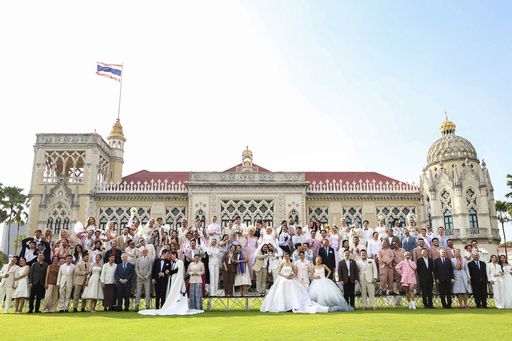
BANGKOK — After being in a dedicated relationship for over 13 years and celebrating their wedding in 2019, Danaya Phonphayung and Sunma Piamboon have always regarded themselves as a married pair, despite the absence of legal recognition for same-sex unions in Thailand. Their home in a suburban area of Bangkok showcases cherished memories through faded photographs encapsulating the joy and love shared with friends and family. This Thursday marks a significant milestone, as a groundbreaking law will come into effect, granting members of the LGBTQ+ community in Thailand marriage rights equivalent to those enjoyed by heterosexual couples.
The couple eagerly anticipates the chance to officially formalize their relationship. They plan to register their marriage at a local district office on the first permissible day following the law’s enactment. “I think I’ll cry,” said Danaya, who works in an office, grinning at the thought of signing the documents. “I’m so happy. It’s something that was more than I could’ve dreamed of, that suddenly this day is happening.” Having built a life together, including purchasing a house and a car, Danaya stressed the importance of securing their rights as a married couple. “We cannot share these things together like a married couple. When this is happening, we feel that it’s our rights that we need to secure as quickly as possible,” she explained.
The progressive marriage equality bill has successfully passed through both chambers of Thailand’s legislature, amending the Civil and Commercial Code by replacing terms like “husband and wife” and “men and women” with “individuals” and “marriage partners.” This pivotal change will allow LGBTQ+ couples access to comprehensive legal, financial, and medical rights that were previously not available to them.
Sunma, who manages a travel agency, shared a poignant experience that highlighted the necessity of legal marriage. When Danaya had to be hospitalized due to dengue fever, her status as a “girlfriend” left her feeling powerless as doctors did not recognize her ability to make decisions regarding Danaya’s care. “I was so upset, like, if I had lost her … there would be nothing that could’ve made up for it,” she recounted, emphasizing the critical nature of this legal recognition for both of them.
Although Thailand is often viewed as an inclusive society, it has faced challenges in passing marriage equality laws due to prevalent conservative values. While there are ongoing issues of discrimination faced by the LGBTQ+ community, activists acknowledge past improvements. The current government, led by the Pheu Thai party, has prioritized marriage equality, even associating itself prominently with the annual Bangkok Pride parade, where thousands gather to celebrate.
Recently, Government House hosted numerous LGBTQ+ couples and activists for a meeting alongside Prime Minister Paetongtarn Shinawatra and other officials, heralding the law’s upcoming enactment. This positions Thailand as the first country in Southeast Asia and the third in Asia, following Taiwan and Nepal, to legally recognize same-sex marriages. The Prime Minister expressed elated sentiments, stating, “It is almost like a dream, but it’s not. So, congratulations to all. I think it’s very important that the world notice us, and know that in this small country we have this kind of thought.”
To facilitate marriage registrations on the law’s first day, the organizers of Bangkok Pride have worked closely with relevant government bodies to host a grand celebration in the city. They anticipate that over 300 couples will formally tie the knot at the event. Ann “Waaddao” Chumaporn, a gender equality activist and lead organizer of Bangkok Pride, emphasized that the law is about restoring dignity and affirming human rights, expressing gratitude for all the love and effort that made this day possible for countless couples.
In preparation for the law’s implementation, traditional values within the government and associated agencies have necessitated workshops aimed at educating staff responsible for marriage registration. These sessions focus on enhancing awareness of gender diversity and fostering effective communication for those seeking services. “It’s like a missing piece of the jigsaw,” remarked Bangkok Deputy Governor Sanon Wangsrangboon, acknowledging the need for understanding from officials, while also recognizing potential initial challenges as they work towards improvement.
Once they officially register their marriage, Sunma looks forward to hosting a joyous celebration alongside their families. “It’s not just the two of us that are happy, but both of our families feel it is a big deal, and it is what everyone has been waiting for. Everyone said they are waiting for Jan. 23,” she shared, reflecting on the greater communal significance of their union.

